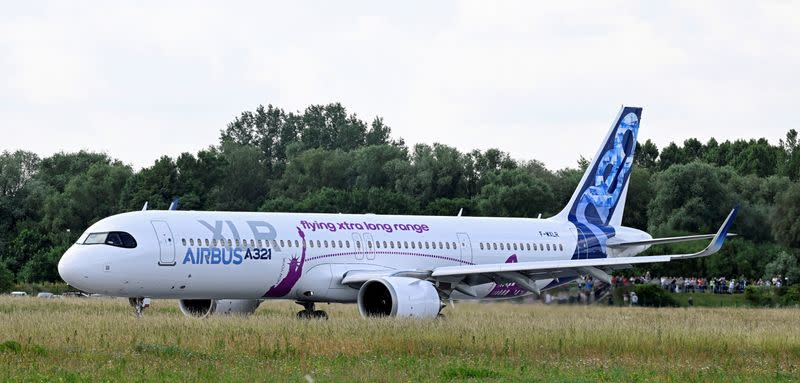PARIS (Reuters) – Airbus has delivered its first A321XLR jet to Spain’s Iberia, the European planemaker said, stepping up a battle with Boeing in the middle of the jet market.
The plane, which took five years to develop and targets a market previously served by Boeing’s out-of-production 757 or larger wide-bodies, was handed over late on Tuesday and was due to fly to Madrid on Wednesday, according to Flightradar24 data.
The delivery, first reported by Reuters on Tuesday, highlights a drive by Airbus and Boeing to extend the performance of the industry’s best-selling single-aisle jets.
Launched in 2019 to steal a march on Boeing’s plans at the time to build a new jet in the middle of the market, the A321XLR targets a gap left by the out-of-production Boeing 757, where the A321 family outsells the largest versions of the 737 MAX.
The industry’s largest single-aisle jet features a novel type of fuel tank, moulded into the contours of the fuselage to eke out more space for fuel and deepen its transatlantic range.
The design initially raised concerns among regulators about the risk of fire and evacuation times in the event of an accident, prompting design changes before it could be certified.
Analysts say the resulting extra weight chipped away at its maximum range, though Airbus says the roughly 200-seat model will still allow airlines to open up multiple new routes.
Iberia plans to introduce the A321XLR on flights from Madrid to Boston after a handful of trials in Europe.
Airbus said it had sold over 500 A321XLR jets, which will be delivered in coming years, reflecting long industry lead times.
PRESSURE ON BOEING
Boeing has said the XLR addresses only a small niche in the overall market for single-aisle jets, the busiest part of the industry, which it pegs at 33,380 aircraft over 20 years.
Critics have also questioned the impact of the range on running costs, suggesting the aircraft and engine will be pushed to their limits and require more frequent maintenance.
However, the delivery also exemplifies pressure on Boeing to win certification for its own largest single-aisle, the 737 MAX 10, following delays by an issue with an anti-ice system. Boeing has said the timing of certification is a matter for regulators.
Iberia has said that the arrival of the A321XLR would help it comply with its environmental commitments, part of an industry-wide effort to eliminate net CO2 emissions by 2050.
The airline plans an event on Nov. 6 to celebrate the latest milestone, though several observers noted the industry’s usual tight discipline on carbon-neutral messaging was dented by the choice of registration marked on the plane’s fuselage: EC-OIL.
The latest Airbus and Boeing single-aisle jets use engines that the industry says will burn at least 15% less fuel.
The jet delivered to Iberia is powered by LEAP engines from CFM International, owned by GE Aerospace and Safran. RTX unit Pratt & Whitney also offers engines for the jet.



